Why Treat Drug Resistant Epilepsy with a Ketogenic Diet?
ESPEN Congress on Clinical Nutrition and Metabolism – Milano, Italy. The home of pizza and pasta……is it a challenge for Keto?!
I was very honoured to be asked to speak at The European Society for Clinical Nutrition and Metabolism (ESPEN) Congress in Milan, Italy on September 7th. My task was to create a presentation answering the question: “Why treat Drug-Resistant Epilepsy with a Ketogenic Diet?” While I frequently speak at keto conferences, meetings, and educational events, sharing my research, clinical insights, and evidence about ketogenic diet therapy, this particular event felt especially significant. Let me explain why and highlight some key points from my presentation! I also consider the feasibility of following a ketogenic diet in the pizza and pasta capital of Europe 🙂 and give you some top tips to consider when travelling on a ketogenic diet.
Every year, ESPEN hold a congress where their aim is to encourage the rapid diffusion of knowledge and its practical application in the areas of nutrition and metabolism. The topics covered are diverse, ranging from malnutrition, nutrition in critical care, and nutrition’s role in managing chronic conditions like cancer, gastrointestinal diseases, obesity, and cardiometabolic health. It’s a massive event, attended by over 4,600 doctors, dietitians, nurses, pharmacists, and scientists. Ketogenic diet therapy is rarely discussed at large clinical nutrition conferences like ESPEN, so it was an exciting opportunity to introduce it to a new audience and showcase its effectiveness in managing drug-resistant epilepsy for children and adults..

Presentation
My presentation was part of a session titled “When Nutrition Cures: How Does it Work?” I shared the stage with experts like Prof. Paulo Lionetti, who spoke about nutrition’s role in treating Crohn’s disease, and Prof. Marco Spada, who discussed metabolic disorders. While we cannot claim that nutrition outright “cures” these conditions, nutritional strategies can be highly effective in managing or treating these diseases. In the case of drug-resistant epilepsy, ketogenic diet therapy can have a curative effect, particularly for those who achieve complete seizure freedom.
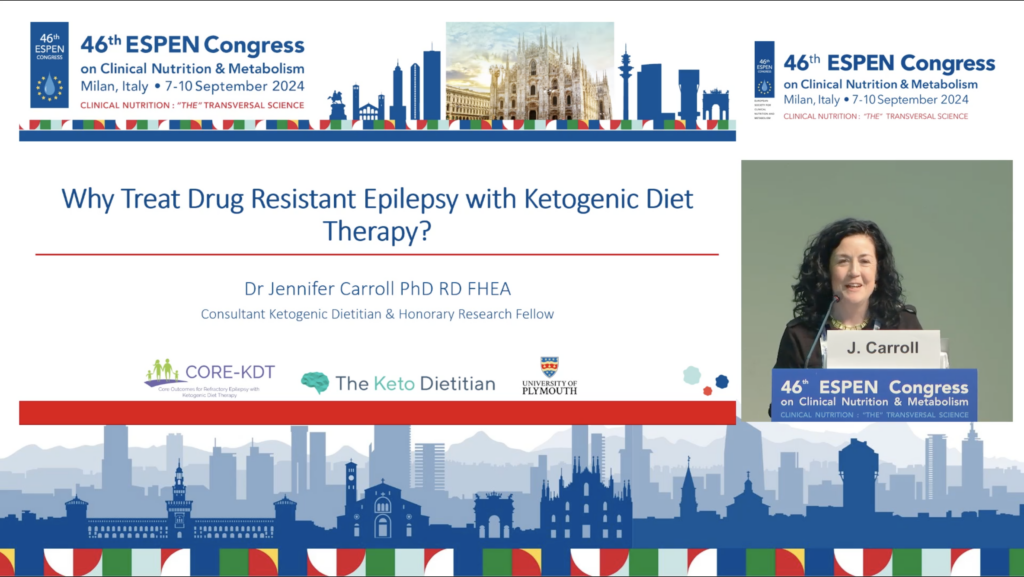
I had 25 minutes to present and my main objectives for the session were to cover the following;
- a brief introduction to drug-resistant epilepsy and ketogenic diets
- the impact of the ketogenic diet on seizure control, backed by compelling for both children and adults
- the additional benefits of KD beyond seizure control
- insights into why parents choose to use KD to treat their child’s epilepsy
- the future of KD, both in terms of my ongoing research and its expanding use in other clinical areas.
This session really highlighted the powerful role nutrition plays, while also emphasising the complexity and importance of collaboration between dietitians and doctors in supporting their patients. The ketogenic diet is highly effective for individuals with drug resistant epilepsy and those with metabolic disorders such as glucose transporter type 1 deficiency (GLUT1) syndrome and pyruvate dehydrogenase deficiency (PDHD). However, ketogenic diet can be life threatening for patients with fat metabolism disorders, which is why we conduct thorough screening and extensive blood and urine tests before initiating a ketogenic diet.
Drug resistant epilepsy and associated treatments
Drug resistant epilepsy describes a state where seizures are not responding to anti-seizure medications and evidence suggests that this affects 33% of individuals with epilepsy (Kwan & Brodie, 2000). It is characterised by frequent and persistent seizures, moderate to severe developmental delay and often detrimental impacts on the child’s quality of life but also the broader family around them. Anti-seizure medications are the mainstay of treatment but surgery may be possible for some depending on the site of the seizure activity. Vagus nerve stimulation and/or ketogenic diet therapy are also viable treatments.
Typically, ketogenic diet should be considered when 2 or more anti-seizure medications have been trialled and failed to control seizure activity (NICE 2022; Kossoff, 2018). However, there are some conditions and epilepsy syndromes where ketogenic diet is even more beneficial than the typical response and hence ketogenic diet should be considered early in the course of the condition. These include Angelman syndrome, Dravet syndrome, Doose or myoclonic atonic seizures , Glucose transporter type 1 deficiency syndrome, pyruvate dehydrogenase deficiency syndrome. infantile spasms, tuberous sclerosis complex and formula fed children or infants.
Evidence supporting the use of ketogenic diet therapy
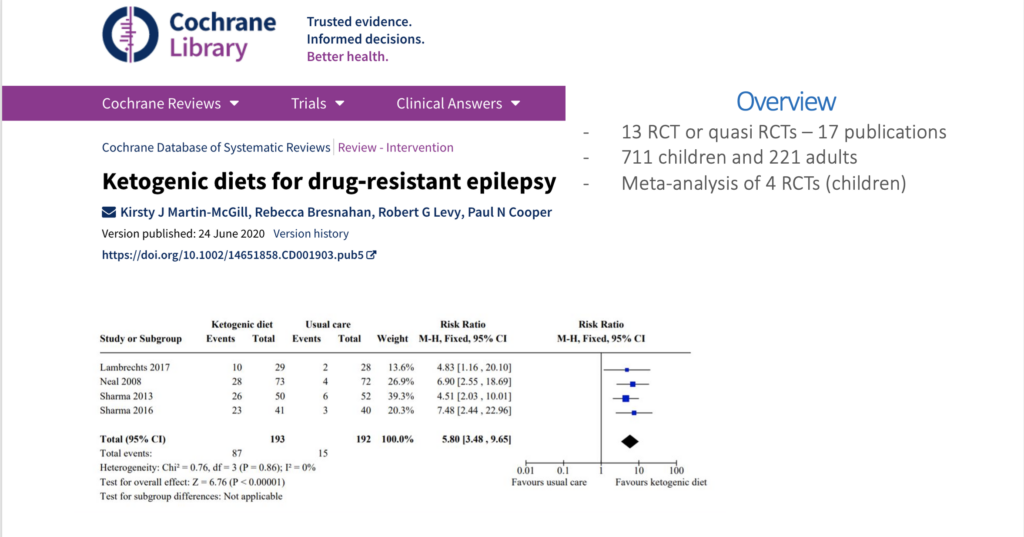
- Cochrane are a respected group who undertake systematic reviews of the literature periodically.
- The most recent review (Martin-McGill et al., 2020) included 13 randomised controlled trials, 711 children and 221 adults.
- For the first time a meta analysis was possible using 4 of the included paediatric studies which demonstrated that ketogenic diet is an effective treatment for epilepsy
- Treated children were up to -3 times more likely to achieve seizure freedom and up to 6 times more likely to achieve 50% or more reduction in seizure frequency
- Treated adults were to 5 times more likely to achieve 50% or more reduction in seizure frequency
What are the positive benefits of ketogenic diet?
For one of my research studies, I interviewed 21 parents whose children had drug resistant epilepsy treated with ketogenic diet therapy to understand their experiences and views (Carroll et al., 2024). During the interviews we explored;
- their child’s diagnosis
- how this had affected them and their family
- what their expectations of the ketogenic diet were before starting and if these were achieved
- the outcomes of treatment with ketogenic diet and the impact of that on thier child and family
- the outcomes or results of ketognei cidet that they feel are most imrptiant to measure
- what the day to day management of ketogenic diet involved
- what could we do to help to make ketogenic diet easier for families
- would a buddy or peer mentor be helpful
Parents described many positive impacts of ketogenic diet therapy (see below). For them personally, they gained a sense of purpose and control, ‘no longer feeling like a passenger’ in their child’s care. Instead they were responsible for taking an active role in the management of their child’s epilepsy, preparing the ketogenic diet for them. Commonly, parents describe how they have ‘got their child back’ owing to the improvements in seizure outcomes (seizure reduction, seizure freedom, seizure severity and status) AND non seizure outcomes such as behaviour, sleep, mood, cognition and ultimately quality of life. Their child may be smiling again, their personality coming through and engaging with their siblings, family and friends. Their cognitive abilities improve with gains in memory, language, speech, concentration and focus. Children gained independence and participated more in life through family activities, school and extracurricular activities.
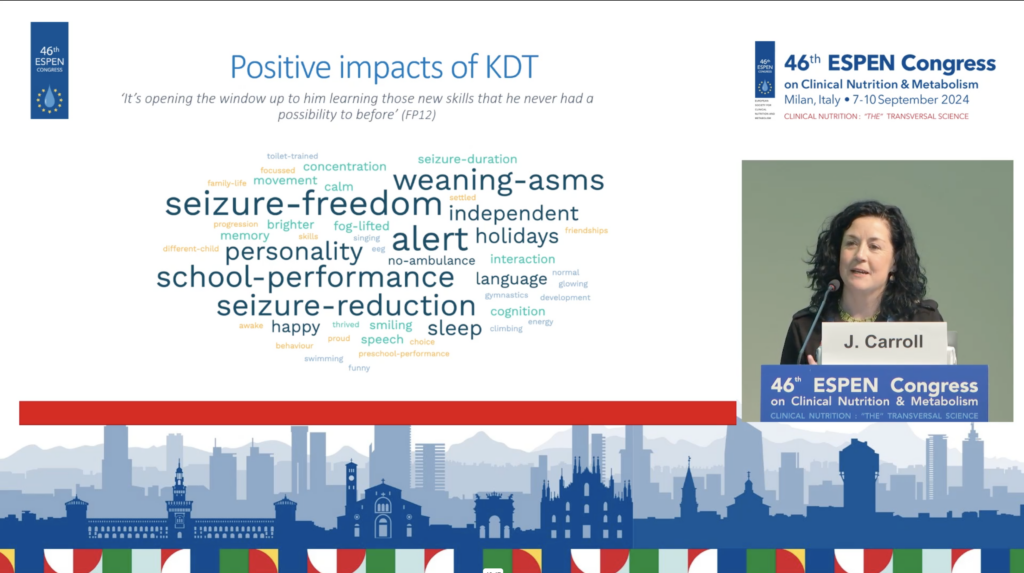
Questions and discussion
In my presentation, I shared my research where I developed a core outcome set for epilepsy treated with ketogenic diet. The session chair emphasised the importance of core outcome sets, noting how they have proven valuable in clinical practice. We discussed the potential adverse effects of the ketogenic diet and the need for close monitoring. I was asked whether adherence to the diet is more challenging for adults, and I agreed that it can be challenging….but it is definitely doable.
- adults typically have more autonomy over food choices, whereas children’s diets are largely managed by their parents.
- adults often eat for reasons beyond hunger— to celebrate, for comfort, or simply because they fancy something.
These can make dietary adherence harder, but many adults are successful with the ketogenic diet and I believe the key to that is supporting them on their journey. Setting realistic expectations and taking a gradual, step-by-step approach, such as reducing carbohydrates over several weeks, can ease the transition first to a low-carb diet and then a ketogenic diet.
Until recently, most of my work has been with children and their parents. Parents typically prioritise their child’s needs and make every effort to ensure the diet works. In contrast, adults undertaking the ketogenic diet often juggle other responsibilities—family, work, or studies—and may not be able to prioritise their own health as much as parents do for their children. As dietitians, we need to meet each individual where they are and work at their pace, rather than imposing our own agenda.
There was considerable interest in the use of ketogenic diets beyond epilepsy. A dietitian asked about my opinion on its use in diabetes, as she was concerned about side effects such as hypoglycemia (low blood glucose levels). The evidence strongly supports the use of lower-carb diets in managing type 2 diabetes, but I acknowledged that implementing a new treatment approach, especially one that challenges conventional norms, can be daunting. That said, we have a responsibility to understand the evidence, discuss the pros and cons with patients, and help them implement dietary changes safely. If evidence demonstrates that a dietary approach can improve a condition, then we should utilise it. Otherwise, patients may attempt drastic dietary changes on their own, which could lead to significant side effects, particularly for those taking medications like insulin and sulphonylureas which can result in hypoglycemia.
Bella Italia!
This was my first visit to Italy and it won’t be my last! What a beautiful country. We started in Milan for the Congress and of course drank lots of great coffee, visited the cathedral Duomo Di Milano and Castello Sforzesco – a huge park in the middle of the city. An absolute highlight for me was visiting the Leonardo da Vinci Museum of Science and Technology and getting up close to a piece of moon rock collected in 1972 by the astronauts of the Apollo 17, the last human mission to the Moon.


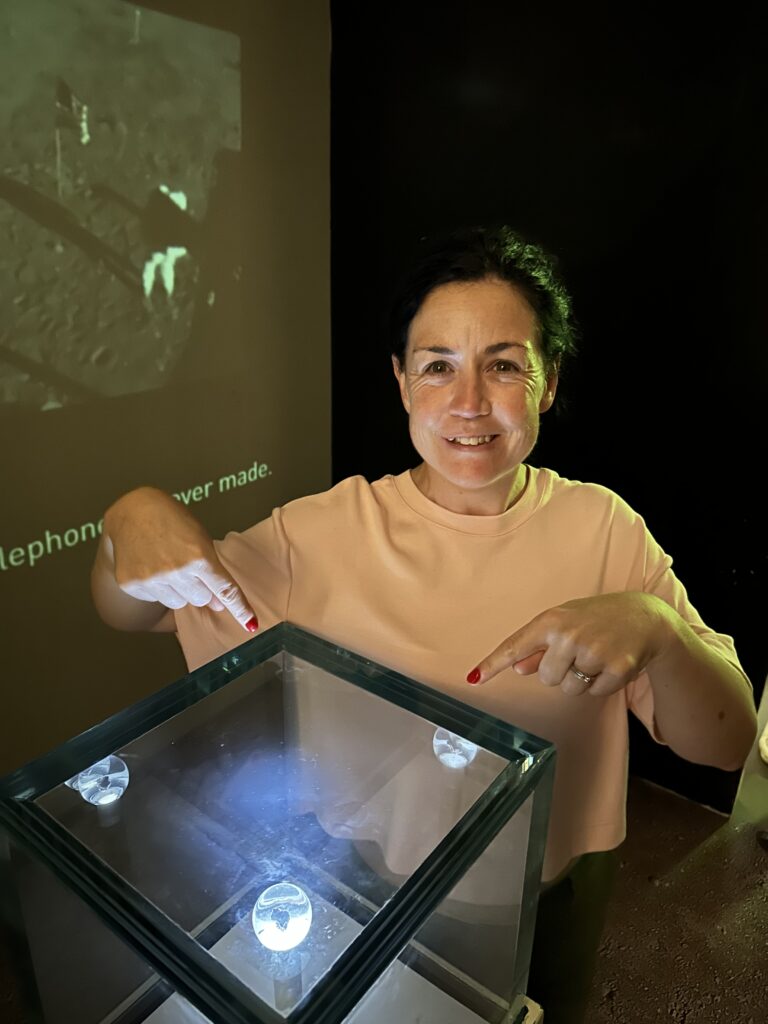

We ended our trip in Como, a city in Northern Italy situated on the shores of Lake Como. Como is a beautiful small city surrounded by the Alps and amazing views of the lake. Its full of medieval architecture and history with fabulous restaurants. We walked for miles exploring the city and lake shore… two nights is not enough!
Can the home of pizza and pasta accommodate a keto diet?!
The short answer is yes of course! Keto is definitely doable in the carb capital of Europe! However, as you would expect it does take some prior planning and thinking ahead. The more I travel, the more I realise how fortunate we are in the UK and Ireland to have a wide variety of low-carb and carb-free products, many of which can be easily found in larger supermarkets. The selection can vary greatly in other countries, so it’s important to plan ahead when traveling.
What worked well?
Though pizza and pasta dominate menus, there are often meat or fish options available too. At home, a steak usually comes with several sides like sauces, vegetables, fries, or potatoes, requiring some adaptation to stick to low-carb options. In Italy, it seems more common for meat or fish to be served on its own without sides, making it easier to “build your own” meal without wasting food. Olive oil and balsamic vinegar are usually on the table, which adds an easy source of fat and flavor.
What might be challenging?
I couldn’t find double or heavy cream, which could be an issue for those relying on it as part of their keto diet. Likewise, crème fraîche wasn’t available in the supermarkets I visited, though mascarpone was. There was also a limited range of artificial sweeteners. Speak with your dietitian before you travel, they might have experience of food availability in that country or can guide on what to look out for.
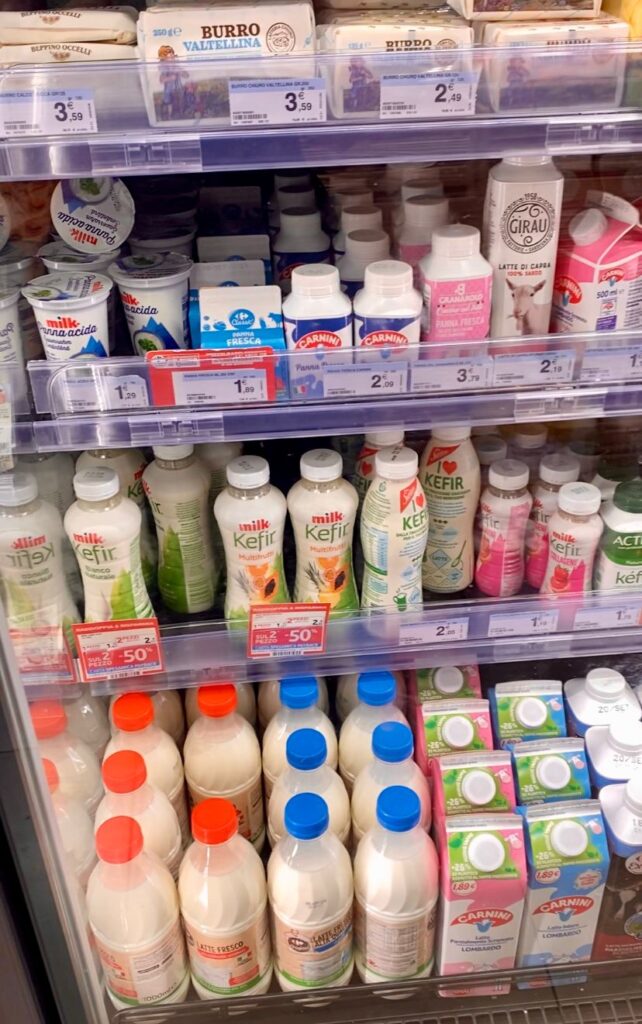
Top Tips when travelling on a ketogenic diet
Plan ahead
- Consider renting an apartment instead of a hotel room, so you can prepare your own meals and have more control over your diet.
- Some airlines allow extra luggage for medical needs; speak with your dietitian who can provide a supporting letter if necessary.
- Plan alternative meals or snacks with your dietitian that don’t rely on products like double cream or crème fraîche.
Pack keto essentials
- don’t rely on finding your usual products. Bring easy to pack dry goods like low or carb free bread, pasta and rice, so you can create simple meals using locally available ingredients like pesto, cheese, meat, fish, butter and olive oil.
- If you use any specialist keto products, bring a supply of these for ease and convenience
- If you enjoy particular keto snack bars or convenience snacks, pack a supply for on-the-go options.
- Bring extra ketone and blood sugar strips (if using) since your levels may fluctuate when away and require more frequent testing
- Pack essentials like medications, ketone meter, strips, keto packed lunch and snacks in your hand luggage in case of delays or luggage loss.
Check food labels
- Always check labels on staples like butter, cream, mascarpone, mayonnaise, and Greek yogurt, as their fat, carbohydrate, and protein content may differ from what you’re used to.
- Don’t forget to check soft drinks, tonics, or soda labels for unexpected carbs.
- Use google translate or similar to help you check
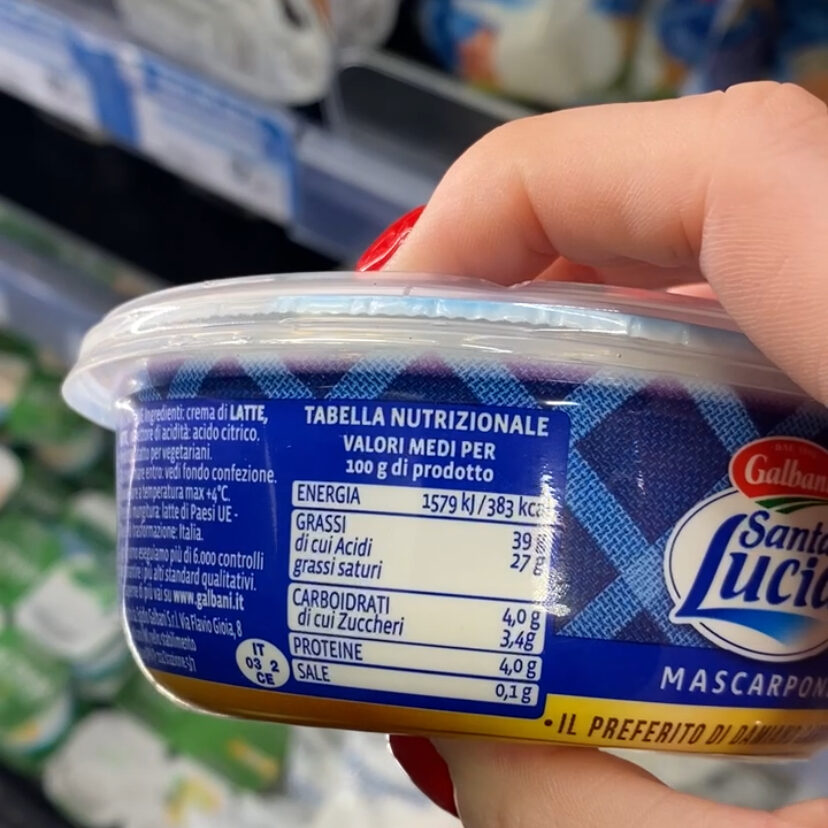
Asking for help
Keto diets may not be well-known in the country you’re visiting, so keep it simple and explain that you need to avoid sugar, bread, rice, and pasta.
Keep it simple
- Italian cuisine often focuses on fresh, simple ingredients. Opt for grilled meats or fish, eggs, sautéed or grilled vegetables or caprese salad, and add your preferred fats.
- Olive oil, and sometimes chili oil, are often on the table—use them liberally!
- Ask for extra butter to accompany your meats and vegetables.
- Choose egg-based dishes for breakfast or a light lunch.
- Enjoy antipasti platters with cheeses, meats, and olives, but skip the bread and crackers.
Keto friendly snacks

- Snack on your favourite low carb fruit like strawberries and raspberries or veg sticks like cucumber and celery sticks
- Nuts and olives make great portable snacks or pair well with coffee while others enjoy Italian biscuits or pastries



